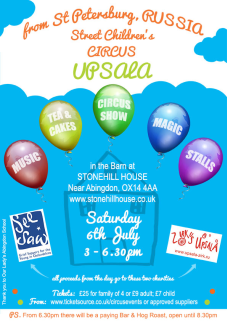2014 Season
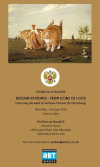
We are pleased to announce a unique exhibition to be held in The Barn at Stonehill.
'Russian Extremes-from Icons to I-cats'.
This is a collection of work by two Russian artists:
Images of six contemporary icons by Archmandrite Zenon painted for the Feodorovsky Cathedral in St Petersburg will be displayed alongside Svetlana Petrova's I-cats.
The I-cats are images taken from The Russian Museum in St Petersburg integrated with images of Zarathustra, the cat.
The exhibition runs from 11am to 5pm daily. Free Entrance.
Further images of I-cats are available from: http://fatcatart.gallery
Saturday 5th April: The Shot that Changed the World – how the assassination of Archduke Franz Ferdinand led to the end of the Romanovs and the birth of the Bolsheviks
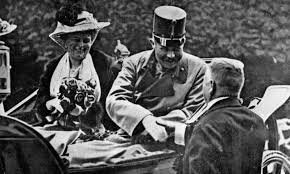 |
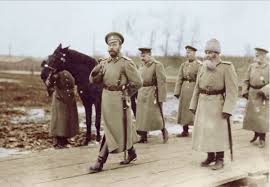 |
Speaker: Christopher Danziger
11:00 – 17:30
The First World War took nobody by surprise, so how did Russia become embroiled in a war for which she was so inadequately prepared? Tsar Nicholas and his ministers effectively signed their own death warrants with their unrealistic foreign policies, diplomatic blunders and incompetent conduct of the war. Russia was made to pay an enormous price for her enforced withdrawal from the conflict but her miseries were by no means over. The end of the First World War merely ushered in three years of a terrible, destructive Civil War from which a splinter party emerged triumphant - to rule Russia for almost a century.
Christopher Danziger will talk us first through pre-war thinking and international relations in Russia and the series of flawed and fatal decisions which led to the overthrow of the Romanov dynasty. In the second half of the day, we look at the aftermath of the Tsar's abdication and how it took three years of brutal civil war before Lenin and the Bolsheviks were established as his successors.
The Russian Five: Musorgsky and the Balakirev Circle - one of the most intriguing and colourful stories in musical history.
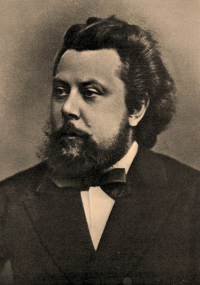
Speaker: Stephen Walsh
The emergence of Russian classical music in the nineteenth century comprises one of the most remarkable and fascinating stories in all musical history. The five men who came together in St. Petersburg in the 1860s, all composers of talent, some of genius, would be—in spite of a virtual lack of technical training—responsible for some of the greatest and best-loved music ever written. Known in the West as the Five, and in Russia as moguchaya kuchka - the Mighty Little Heap - these friends, competitors, and creative intellectuals, Mily Balakirev, César Cui, Alexander Borodin, Nikolay Rimsky-Korsakov and, most importantly, Modest Musorgsky, are brought to life in Stephen Walsh's illustrated lecture.
Exploring the Arts in Russia
A series of informal talks on Russian literature, music and film.

Creative Writing with Anne Aylor
2013 Season
MYSTICISM in early Soviet Russia
Speaker: Sergey Moskalev (author and editor of 'Science & Religion' magazine, Moscow)
Soviet Russia is viewed as a time of spiritual sterility, repression and an enforced atheism. But the country's rich and ancient spiritual heritage, while suppressed under communist rule, could not be entirely eradicated from the Russian psyche. The beginning of the 20th century in Russia, scene of war and Bolshevik activities, was also a time of growing interest in mysticism and esoteric phenomena.
Sergey Moskalev, author and editor of Moscow-based magazine, Science & Religion, takes us through the early Soviet era and traces the profound spirituality underpinning much Soviet art.
We begin with Tolstoy, a devoutly religious man who early on embraced pacifism, the immorality of property-ownership and vegetarianism. Still revered as the greatest Russian author of all time, he was held up by the emerging Communist movement as a hero of their principles and was lauded by the Bolsheviks after his death as a forerunner of socialism.
We then move on to look at spiritualism in other art forms, including Scriabin's Mysterium, Roerich's commitment to spiritual values and occult mysticism, Peter Ouspensky and the concept of eternal return, Dr Azarov and the origin of Zoizm and Mikhail Bulgakov's The Master & Margarita. The talk also embraces the concept of the noosphere (the effect of human cognition on Earth's evolution) developed by Vladimir Vernadsky in the 1900s , before we take a brief look at Barchenko and the Soviet Government's research on telepathy and telekinesis in the late 1920s.
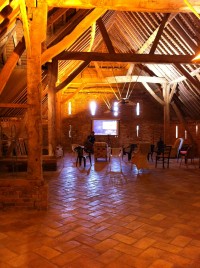 |
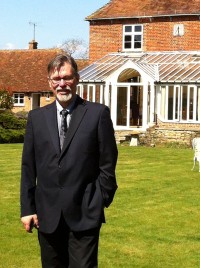 |
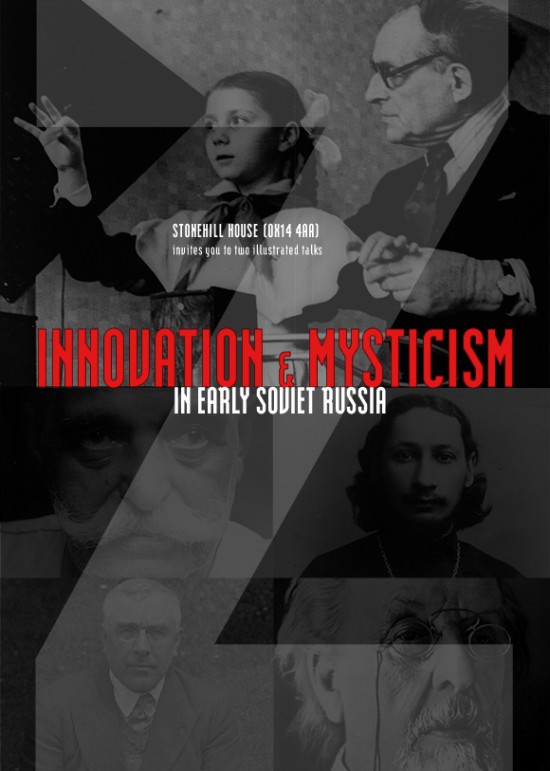 |
| Getting the barn ready | Sergey Moskalev at Stonehill | Mysticism in early Soviet Russia |
LEON THEREMIN and the invention of electronic music in early Soviet Russia.
The hectic period of the 1910-30s was a time of complex and inconsistent social and political movements which define an epoch filled with revolutions, wars and totalitarian dictatorship. Despite the circumstances, early Soviet culture accumulated unprecedented levels of creative energy which led to amazing innovations at the beginning of the 20th Century. Living in famine, extreme cold and poverty, creative people were nonetheless dreaming about a future country where everything would be different: the perfect man, a universal language, real machines……Artists, poets, musicians and architects rushed enthusiastically into the new reality, studying physics and mathematics, embracing the scientific exploration of the nature of light and sound and developing theories about what became known as 'the Art of the Future'…….While the history of Russian post-revolutionary avant-garde art and music is fairly well documented, the inventions and discoveries, the researchers of sound, creators of musical machines and founders of new musical technologies have largely been forgotten, with the exception of Leon Theremin, inventor of the theremin-vox (1919).
As a physicist, musician and engineer Leon Theremin worked on innumerable projects at the cross roads of creative technology. His life story is a fascinating one, not least for his secret work for the NKVD (KGB). He realised the possibility of producing pitched sound while fixing a radio station during the Civil War. The theremin-vox (originally called an etherphone) consists of two metal antennae which sense the position of the player's hands and control oscillators for frequency with one hand, and amplitude with the other, so it can be played without being touched. After visiting America in the 1920s and patenting the instrument with RCA, Leon Theremin returned to Soviet Russia only to be banished to the Kolyma Prison camp in Siberia for several years by Stalin. Leon Theremin nevertheless lived to be 97, spending the rest of his life in Soviet Russia.
Robert Moog in America started his career by building theremins in the 1950s.
Talks by Andrey Smirnov (founder of the Theremin Centre in Moscow)
Followed by Demonstration & Performance of Theremin-Vox by Lydia Kavina (see photograph as a child with Leon Theremin at top of this page'), accompanied on piano by Elena Kiseleva (works by Prokofiev and Rachmaninov)
OTHER TALKS
Russia in 1913 was poised on the brink of change, witnessing both growing political unrest and a vibrant flourishing of the arts. A dazzling list of composers, painters, dancers and poets - Stravinsky, Diaghilev, Rachmaninov, Pavlova, Chekhov, Kandinsky, Stanislavsky - was begining to emerge. In the centenary of this extraordinary year, pivotal in the history of Russia and its last year of peace before the dark clouds of war and revolution descended, Rosamund Bartlett returns to Stonehill House with a series of talks.
Kandinsky and the Russian North
Modernist Moscow, Art Nouveau and Scriabin
Diaghilev's 'World of Art': Modernist St Petersburg: the Bohemians
'The Rite of Spring' and 'Victory Over the Sun'
2012 Season
Film-maker, Andrei Tarkovsky - his spiritual journey, including a screening of "Mirror"
Speakers: Mark Le Fanu (more info)
Writer, journalist and lecturer on film, Mark le Fanu explores some of the facets of Tarkovsky's artistic enterprise: his sense of history, his celebration of family, his struggles with faith, his patriotism and his lyrical openness to the beauty of the world. (more info)
Stravinsky & Diaghilev
Speaker: Rosamund Bartlett (more info)
Born in 1882 near St Petersburg, Igor Stravinsky died an émigré in 1971, his productive and often turbulent life spanning the key Russian events of the last century. His masterworks such as The Firebird and The Rite of Spring fixed his reputation as a leading composer.
After Tchaikovsky had made it into a serious genre in its own right, Russian ballet was at its prime, with Nijinsky and Pavlova amongst its greatest stars. In 1910 began Diaghilev's famous collaboration with Stravinsky, the enfant terrible of 20th-century music. After The Firebird came Petrushka, and then in 1913 the Parisian haute monde was shocked to its core by the epoch-making The Rite of Spring, one of the key works which catapulted Russian artists and musicians into the forefront of the European avant-garde.
Boris Pasternak - a glimpse into family correspondence
Speaker: Nicholas Pasternak Slater (more info)
"Boris Pasternak's nephew, Nicolas, is our host for the day. Serene and eloquent, wise and welcoming, he leads us through the compelling story of his family....." read full review
"Nicolas Pasternak Slater grew up in a household where his absent uncle was a constant presence, a figure he felt he knew intimately despite never directly communicating with him." (read full article)
Chekhov & Tolstoy - their lives and their prose
Speaker: Rosamund Bartlett (more info)
Author and translator Rosamund Bartlett discusses the lives of two very different writers who had an abiding affection for each other. Her illustrated talks provide a political and cultural background to these literary colossi.
"Such a hugely enjoyable day on Tolstoy and Chekhov. A combination of input by an authoritative and engaging lecturer, Dr Rosemary Bartlett with a historic and beautiful setting. And a gifted chef! Thank you." - Anne Dodd
20th Century Russian Poetry in an age of repression
Speaker: Robert Chandler & Masha Karp (more info)
Translators Chandler and Karp read a selection of poetry, some in translation, some in the original by Russian poets Fet, Ahkmatova, Tsevetaeva, Mandlestam and others. Together they discussed the lives of creative people living under Stalinism.
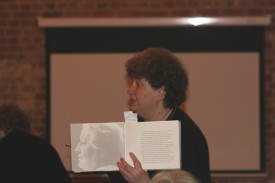 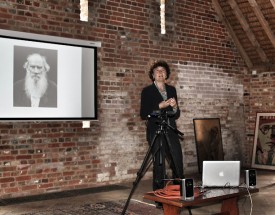 |
MORE ABOUT OUR SPEAKERS
- Mark Le Fanu
Anyone interested in attending this Tarkovsky day who might like to read a little more about the director in advance, is encouraged to visit the excellent Tarkovsky website www.nostalghia.com. Mark Le Fanu's book "The Cinema of Andrei Tarkovsky" (British Film Institute, 1987, second edition 1990) is unfortunately out of print, though perhaps available in good libraries. A sound current short introduction to Tarkovsky's films is by Sean Martin ("Andrei Tarkovsky", Kamera Books, second edition 2011). In addition, all seven of Tarkovsky's films are currently available on DVD, either individually or in a DVD box set. (more info)
Back to top of Page
- Nicolas Pasternak Slater
Nicolas Slater is the son of Boris Pasternak's sister Lydia. He has divided much of his life between working as a medical specialist in haematology and as a translator, publishing both scientific and literary translations, including Boris Pasternak's autobiographical essay People and Propositions and more recently the poet's correspondence with his family. He has also translated works by Lermontov and Pushkin, which will be published in the near future. The weekend includes a rare opportunity to visit the Pasternak Museum in Oxford.
Back to top of Page
- Rosamund Bartlett
Rosamund Bartlett works as a writer, translator and lecturer, and specialises in Russian and European cultural history. Her latest book, Tolstoy: A Russian Life (Profile, 2010), was published last November to mark the centenary of Tolstoy's death, and was longlisted for the Samuel Johnson Prize. Her previous books include Wagner and Russia (Cambridge UP), Chekhov: Scenes from a Life (Free Press), Literary Russia: A Guide (co-authored with Anna Benn), and the edited volume Shostakovich in Context (Oxford UP, 2000). Rosamund also recently completed a new translation of "Anna Karenina."
Back to top of Page
- Robert Chandler and Masha Karp
Robert Chandler has published poems in the TLS and other journals. His translations of Sappho and Apollinaire are published in the series "Everyman's Poetry", and his translations of Vasily Grossman and Andrey Platonov have won prizes both in the UK and the USA. His "Russian short stories from Pushkin to Buida" is published by Penguin Classics. This December, Penguin Classics will be publishing his anthology of Russian folk tales, and in 2014 they will publish the anthology of Russian poetry in translation that he is working on now.
Masha Karp is a translator of English and German poetry and prose into Russian and has published translations of many writers, including Virginia Woolf, George Orwell, Dylan Thomas and W.H. Auden. She is a member of the St Petersburg Writers' Union and the Literary Translators Guild in Russia. As Chair of the Pushkin Club in London, Masha runs regular Translators' evenings, for the discussion of translations of Russian poetry and prose.
Back to top of Page
St Petersburg Children's Circus
Back to top of Page
